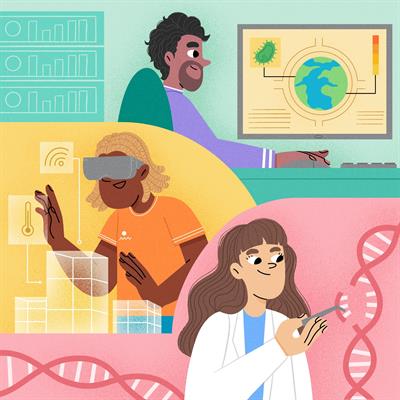
The World Economic Forum Collection - Top 10 Emerging Technologies of 2024
Collection Editors
Robert Knight, Idan Segev, Ruth Morgan, Mariette DiChristina-GerosaViews
130,245 viewsParticipating Sections
Submission Deadline
Closed
Articles

Engineering and Technology
04/06/2025
Tackling the Too-Many-Devices Problem
Authors
Mohamed-Slim Alouini, Christos Masouros
Engineering and Technology
04/06/2025
Revolutionizing Wireless Networks With...
Authors
Mohamed-Slim Alouini, Marco Di Renzo, Javier Garcia Martinez
Engineering and Technology
04/06/2025
Flying High to Bring the Internet Everywhere
Authors
Mohamed-Slim Alouini, Mariette DiChristina
Engineering and Technology
04/06/2025
Building Better With Virtual Tools
Authors
Carlo Ratti, Landry Signe, Izuru Takewaki
Engineering and Technology
04/06/2025
Elastocalorics: Cooling Buildings With Metals...
Authors
Adriana Greco, Claudia Masselli, Mine Orlu, Wilfried Weber
Engineering and Technology
04/06/2025
Turning Pollution Into Solutions Using Microbes
Authors
Sang Yup Lee, Hailong Li, Wilfried Weber, Zequn Yang
Engineering and Technology
04/06/2025
Can Artificial Intelligence Help Scientists...
Authors
Andrew Maynard, Sang Yup Lee, Olga Fink, Thomas Hartung
Engineering and Technology
04/06/2025
Safer Ways for Researchers to Share Sensitive Data
Authors
Olga Fink, Lisette van Gemert-Pijnen, Dongwon Lee, Andrew...
Engineering and Technology
04/06/2025
Feeding Farm Animals While Saving the Planet
Authors
Mariette DiChristina, Javier Garcia Martinez
Engineering and Technology
04/06/2025
Saving Lives With Gene-Edited Organs
Authors
David K. C. Cooper, Emanuele Cozzi, Geoffrey Ling, Bernard...About this collection
Technology is advancing at an incredible pace, bringing new solutions to some of the world's biggest challenges. Each year, the World Economic Forum—an international organization that brings together leaders from government, business, and science to discuss major global issues— identifies the "Top 10 Emerging Technologies". These technologies are chosen for their potential to transform industries, improve lives, and protect the planet. In this collection, we explore cutting-edge technologies from 2024 that are leading this wave of change. Those top 10 emerging technologies are:• AI for Scientific Discovery – Scientists are using artificial intelligence (AI) to speed up discoveries in medicine, energy, and climate science. AI can sort through huge amounts of information, find patterns, and even help design new medicines and materials faster than ever before.
• Reconfigurable Intelligent Surfaces – Special “smart” surfaces, like walls or ceilings, can control wireless signals, making internet connections stronger and more reliable. These surfaces could help boost Wi-Fi at home, keep factories running smoothly, and improve communication in places where signals are often blocked.
• Elastocalorics – Some special metals can heat up when stretched and cool down when relaxed, similar to how muscles work. When used for heating and cooling, these systems could replace traditional air conditioners, heaters, and refrigerators, using less energy and protecting the planet.
• Synthetic Data for Secure Information Sharing – Sharing data without revealing sensitive personal information is becoming easier. Scientists can generate realistic but artificial datasets that reflect real-world patterns, allowing researchers to study important topics like health and finance while keeping private details safe.
• High-Altitude Platform Systems – Solar-powered balloons and aircraft that float high in the sky could bring internet access to remote places. They could also help track wildfires, monitor weather, and restore communications after disasters.
• Integrated Sensing and Communication – Devices that can sense their surroundings and communicate at the same time could make the world safer and smarter. This technology could help self-driving cars avoid accidents, help farmers to use resources wisely, and make power grids more efficient.
• Gene-Edited Organs for Transplantation – Scientists are using gene editing to make organs—even organs from animals—safer for humans who need transplants. These organs could help save lives by reducing the amount of time people have to wait for critical transplants.
• Immersive Technology for Construction – Special computer tools, like virtual reality and digital blueprints, let builders plan and test ideas before construction begins. This helps reduce mistakes, save materials, and make buildings safer and more eco-friendly.
• Alternative Animal Feeds – Instead of using traditional animal feed that requires lots of land and water to grow, farmers are testing new options like insects and algae. These alternative protein sources could help protect the environment while keeping farm animals healthy.
• Engineered Microbes for Carbon Capture – Some tiny organisms like bacteria can absorb carbon dioxide from the air and turn it into useful products, like fuels and fertilizers. Scientists are working on ways to grow these microbes in special systems to reduce pollution and help fight climate change.
These top 10 technologies shaping the future, and as they continue to evolve they could change the way we live, work, play, and solve global challenges. As you read the articles in this collection, you will learn about how these technologies work, where they are already making an impact, and what obstacles still need to be overcome. The future is being built today—let’s dive in!
Would you like to submit to this collection?
For researchers interested in submitting to this Collection, please consult our author guidelines and check that you have all the essentials included before submitting
















